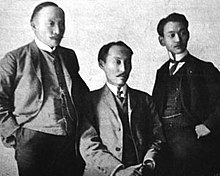Yi Wi-jong
| Yi Wi-jong | |
|---|---|

Yi Jun, Yi Sang-Seol and Yi Wi-Jong (Hague Secret Emissary Affair)
|
|
| Born | 1884 Kingdom of Joseon, Hanseong |
| Died | 1917 Eastern Front |
| Allegiance |
|
| Service/branch | Imperial Russian Army |
| Years of service | 1911–1917 |
| Rank | Podporuchik |
| Battles/wars | World War I (Eastern Front) |
| Awards | Order of Merit for National Foundation (1962) |
| Yi Wi-jong | |

Yi Jun, Yi Sang-Seol and Yi Wi-Jong (Hague Secret Emissary Affair)
|
|
| Korean name | |
|---|---|
| Hangul | 이위종 |
| Hanja | 李瑋鍾 |
| Revised Romanization | Yi Wi-jong |
| McCune–Reischauer | Yi Wi-jong |
Yi Wi-Jong(1887–1917) was a Korean diplomat and military officer. His name in Russian is Vladimir Sergeyevich Lee (Russian: Владимир Сергеевич Ли). His father Yi Beom-Jin was a politician. Yi Wi-Jong took part in World War I as a 2nd lieutenant(Podporuchik) of Imperial Russian Army and was killed on Eastern Front in 1917.
Yi was born in 1887. In 1907 he, Yi Jun, and Yi Sang-seol were delegrated by Emperor Gojong to attend the Second Hague Peace Conference at The Hague. At that time, he was proficient in seven languages. However, they were blocked from joining the conference due to the objections of Japan's representative. However, thanks to the assistance of the Journalists Association, Yi was able to give a speech about Japan's invasions of Korea. Yi Wi-Jong buried Yi Jun at The Hague and went to the United States with Yi Sang-seol, and from there to Vladivostok and Saint Petersburg.
In 1911, after his father killed himself, he became a military officer of the Imperial Russian Army and participated in World War I. He was killed on Eastern Front in 1917.
His father Yi Beom-Jin was a Korean politician and diplomat. He married a Russian noble in 1906. He is Sejong the Great's Descendants.
...
Wikipedia
